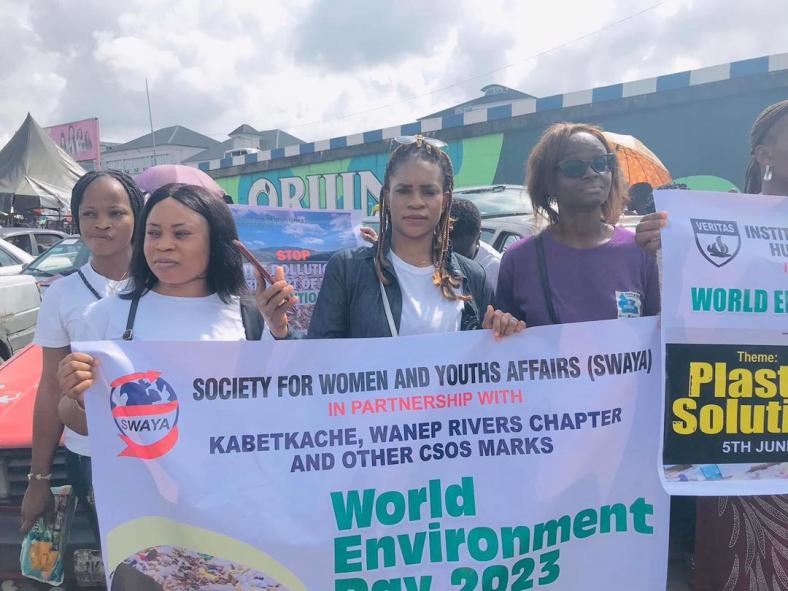Civil society groups in Rivers State, in association with Kebetkache Women Development and Resource Centre, on Monday embarked on a road walk to commemoratekthe 2023 World Environment Day, with the theme ‘Solutions to Plastic Pollution: #BeatPlasticPollution.
The road walk which kicked off from the Isaac Boro Park, Aba Road, Port Harcourt took the activists through the major road to a key market, the Port Harcourt Fruit Garden to Dline.

Traders and transporters at the Abali Park and the Fruit Garden were sensitized on the dangers of blocking drainages and how to protect the environment by reusing plastic bags, using natural bags from paper.
A message from the executive director of Kebetkache, Obom Emem Okon read by Mrs Patience Ekong, senior programmes officer of the organization noted that plastics are harmful to man, the ecosystem and livelihood and called for a shift.
“The plastic we use can harm people and the environment. The things that make plastic so attractive are the same things that make it so harmful to people’s health and the environment. Everything made of plastic starts with a resin made from petroleum that is combined with chemicals and usually not tested for safety. Plastic items such as bottles, toys, to-go containers, medical supplies, car bumpers, foam, and more affect our environment and our bodies.

“Some of the chemicals used to soften plastics and to carry fragrance in many everyday products, are linked to birth defects and are harmful to the reproductive system. Plastic pollution reduces ecosystems’ ability to adapt to climate change. It affects livelihoods, food production capabilities and social well-being”.
She said this year’s Environment Day theme, ‘#BeatPlasticPollution: Solutions to Plastic Pollution’, “is a reminder that people’s actions on plastic pollution matter,” demanding accelerate actions to “beat plastic pollution and transit to a circular economy.”
Emem noted that while the solutions must involve every sector, government and local authorities need to drive the change by formulating “policies to reduce the production of harmful and unnecessary plastics, incentivize sustainable business practices and invest in better waste management infrastructure’.
Kebetkache boss called on investors to support the transition with funds and setting standards.
“In order to transition enterprises and sectors away from the manufacturing of harmful plastics and toward circular economies on plastics, investors have to play critical roles in raising funds and establishing standards,” she stated.
She urged non-governmental organizations, faith-based organizations, and community groups to as potent agents of change in society, speak up against plastic pollution. “We can all influence change by speaking out against plastic pollution and taking actions.

She challenged government to make environmental sanitation a priority public health policy
“Kebetkache particularly calls on the new administration at all levels in Nigeria to prioritize environmental sanitation in public policy and development interventions. We also call on government to mitigate the climate crisis by implementing sustainable solutions to the environmental problems in Nigeria, especially in the Niger Delta where the impact of fossil fuel extraction has impacted negatively on the people and their environment,” she said.

Specifically, she called on state governments in the Niger Delta to show accountability in the utilization of the 13 per cent Derivation Fund and to prioritize the recycling of waste, as critical investments that advance the rights of Niger Delta people and communities, especially women, children, and the elderly.
She charged the National Assembly, relevant ministries and regulatory agencies to hold all international and local oil operators in Nigeria to account for all acts of environmental pollution that foster ecosystem destruction in the Niger Delta.


